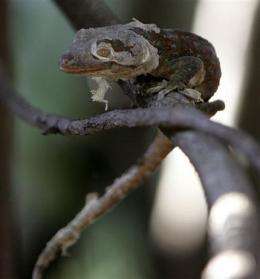A moulting gecko clings to a twig as it is released into the sprawling compound of the Parks and Wildlife office at suburban Quezon city east of Manila, Philippines Friday July 15, 2011. Environment officials have expressed alarm about the growing illegal collection of the reptile in the Philippines with no less than the Health department warning Friday against using geckos to help treat AIDS and asthma, saying the folkloric practice that has spawned a thriving trade of Geckos in parts of Asia may put patients at risk. (AP Photo/Bullit Marquez)
(AP) -- The Philippines warned Friday against using geckos to treat AIDS and impotence, saying the folkloric practice in parts of Asia may put patients at risk.
Environmental officials have also expressed alarm about the growing trade in the wall-climbing lizards in the Philippines. An 11-ounce (300-gram) gecko reportedly sells for at least 50,000 pesos ($1,160).
Geckos are reportedly exported to Malaysia, China and South Korea, where they are used as aphrodisiacs and as traditional medicine for asthma, AIDS, cancer, tuberculosis and impotence.
Their use as medical treatments has no scientific basis and could be dangerous because patients might not seek proper treatment for their diseases, a health department statement said.
"This is likely to aggravate their overall health and put them at greater risk," it added.
Treatments for asthma are easily available and affordable, while there are antiviral drugs to control the progress of HIV, it added.
Geckos are carnivorous, nocturnal reptiles from the family Gekkonidae that are found in tropical countries. They are known for their sticky footpads that allow them to climb vertical surfaces, including glass.
Wildlife official Mundita Lim said her office has asked law enforcers to look into the possibility that scammers may have infiltrated the trade because of the exorbitant prices being quoted online by buyers demanding geckos weighing at least 400 grams (14 ounces).
She said geckos in the wild grow up to 200 grams (7 ounces). Those fattened in captivity can grow only up to 300 grams (10 ounces).
In folkloric practice, geckos are dried and pulverized to use as medicine, and there are anecdotal accounts of the saliva or internal organs being collected, according to Lim.
Environment Secretary Ramon Paje earlier warned that collecting and trading geckos without permit can be punishable by up to four years in jail and a fine of up to 300,000 pesos ($6,900).
He said a healthy population of geckos is needed to regulate pests and maintain the fragile ecosystem. Geckos feed on insects and worms. Larger species hunt small birds and rodents.
©2011 The Associated Press. All rights reserved. This material may not be published, broadcast, rewritten or redistributed.





















